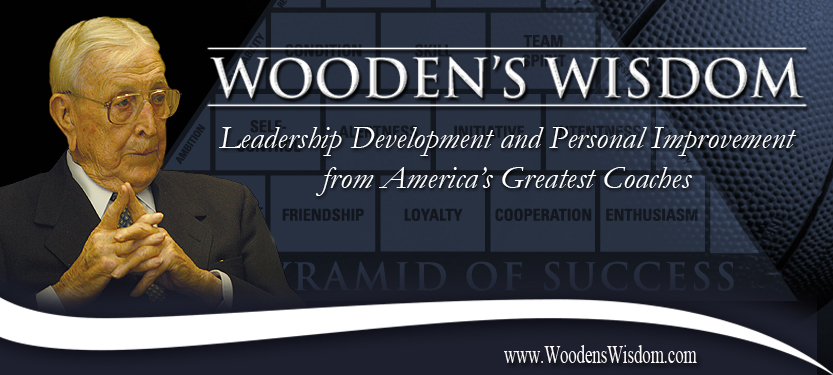 |
|
| Wooden's Wisdom - Volume 2 | Issue 73 |
| Craig Impelman Speaking | Championship Coaches | Champion's Leadership Library Login | |
|
WHEN EVERYONE THINKS ALIKE, NO ONE THINKS
This maxim of Coach Wooden was a cornerstone of the approach that he took in assembling and working with his assistant coaches. In his book Wooden on Leadership with Steve Jamison, Coach stated his view on the subject:
I believe one of the requirements of good leadership is the ability to listen—really listen—to those in your organization. Being a good listener, however, is only half of the equation.
As a leader, you must be confident enough to employ individuals who aren’t afraid to speak up and voice their opinion. If you’re willing to listen, it means little if nobody is willing to talk in a substantive manner.
In his book A Game Plan for Life: The Power of Mentoring with Don Yeager, Coach cites the method Abraham Lincoln took in building his political team as an example of this approach:
In Doris Kearns Goodwin’s exceptional text Team of Rivals, Goodwin examines in profound depth a well-documented but not widely discussed political decision: When Lincoln was elected to the presidency, he appointed a number of former political opponents to serve as his advisers and to fill various posts.
By selecting men whom he knew disagreed with him or differed from his own platform, he assured himself that he would be confronted with legitimate challenges to his ideas, rather than finding himself in a pool of “yes” men. This meant that his policies would emerge more clearly reasoned and justified.
Coach then describes how he worked with his assistant coaches:
There were times when we differed on strategy or game philosophy. Those disagreements never got heated, but sometimes they were very intense.
Just as I imagine Lincoln would have been, I was pleased when those challenges arose because it meant that my fellow coaches were as passionate about our team as I was. Nothing ruins a team more quickly than apathy.
Based on Lincoln’s example, I encouraged my assistant coaches to speak up with ideas that might differ from or even completely contradict my own.
One of the main reasons why this philosophy works, I think, is that at its core is genuine concern and regard for the other parties.
Lincoln truly cared about the opinions of his comrades, and he truly cared about the outcomes of their discussions. But further, he treated them with respect so that they would continue to offer those opinions.
Coach did not view challenges to his ideas as disrespect, but rather as an important requirement of his leadership strategy. Yours in Coaching,
Craig Impelman
Twitter: @woodenswisdom
|
LISTENING
Gifts abound
|
|
For more information visit www.woodenswisdom.com |
|
© Copyright 2026 WoodensWisdom.com | # of Times Wooden's Wisdom Issues Opened: 7,866,928
Hosting & Design by:EverydayWebDesign.com